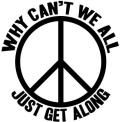skip to main |
skip to sidebar
Talking Point #3--Gayness, Multicultural Education, and Community
Dennis Carlson: Gayness, Multicultural Education, and Community
Premise:
- gay
- lesbian
- silent
- American culture
- invisible
- dominant ideas
- "normal"-straight
- struggle
- respect
- education
- democracy
- stereotypes
- maturity
Authors Argument:
Carlson argues that teachers need to engage young people in making a democratic society with respect for gay people and that public schools should build a new democratic community recognizing differences in gender, race, and sexual identity.
Evidence:
1. "Homosexual is an ostensibly neutral category, one designed by scientists; and yet is usage may involve a scientific distancing from the homosexual object of study and a refusal to see the political and cultural elements of sexual identity. 'Gay' and 'lesbian'../ are the most 'politically correct' labels, although their usage tends to further divide and separate men and women when in fact homophobia and oppression are directed against homosexuals as a group"(235). -- This quote states that people use these types of words to stereotype others without knowledge of what the words really mean.
2. "At the level of state educational policy, it is noteworthy that no state currently recognizes gay and lesbians as legitimate minority or cultural groups to be considered in textbook adoption or to be included in multicultural education; and a number of states explicitly prohibit teaching about homosexuality" (236). --This quote bothers me because if we are teaching in a democratic society, in that case, "we hold these truths to be self-evident, that all men are created equal, that they are endowed by their Creator with certain unalienable Rights, that among these are Life, Liberty and the pursuit of Happiness."
3. "These abuses get tolerated because gay teacher and students operate in an environment where they feel afraid to stand up for themselves, and because any discussion of gay people continues to be absent in the curriculum so that homophobia is not interrogated" (239). -- Students need to be taught respect for everyone, it is hard to believe that people can be so harsh and arrogant. At the same time I feel horrible for teachers or students that are afraid to stand up for themselves and are intimidated by other people's beliefs.
Questions/Comments/Points to Share:
This article was very interesting and like all the other class readings, very eye opening. I liked how the author used specific examples, such as the male substitute teacher who was called "Mr. Faggot" and the student changing classes who dropped his books and then another student kicked them around. It bothers me that people who are homosexual have to go through struggles such as this (so does people of color, handicapped, etc.). Another thing that came to my mind when reading this article was the word "fag." In school a few years ago (I don't remember what class or when), a teacher was talking about the word "fag" and how it is used incorrectly. The word "fag" refers too a type of cigarette, I don't get how those two are connected!! In conclusion, I agree with Carlson, since we live in a democratic society teachers need to teach that we have to respect EVERYONE.
Richard Rodriguez: Aria, Tongue Tied
Premise:
family
tradition
language
bilingual
embarrassment
resisted
English
Spanish
silence
shyness
public society
private society
Author's Argument:
Richard Rodriguez argues that teachers need to recognize that their are two ways a person is individualized, privately and publicly; and teachers also need to realize that a child maybe silenced or shy because of the difference of language used in the classroom and at home.
Evidence:
1. ".. there are two ways a person is individualized. So they do not realize that while one suffers a diminished sense of private individuality by becoming assimilated into public society, such assimilation makes possible the achievement of public individuality" (39). Rodriguez is showing that teachers need to recognize that children are different in public/private situations.
2. "We remained a loving family, but one greatly changed. No longer so close; no longer bound tight by the pleasing and troubling knowledge of our public separateness" (36). This quote reveals the changes of his family and how the English language impacted the family also. The loss of their language is like losing their individuality and tradition.
3. "Because I wrongly imagined that English was intrinsically a public language and Spanish an intrinsically private one, I easily noted the difference between classroom language and the language of of home. At school, words were directed to a general audience of listeners. Words were meaningfully ordered. And the point was not self-expression alone but to make oneself understood by many others" (34). Here Rodriguez identifies the difference between the two settings public-private and how the language at school is directed to a general audience.
Questions/Comments/Points to Share:
I really liked reading this article, I thought it was really easy to read and it was eye opening. It helped me recognize what I need to be aware of when becoming a teacher. I think it is upsetting that teachers can be intimidating to children that seem shy or timid, when they don't really know the specific reason. Teachers need to recognize that children are brought up around the language that is most spoken at home and it can be hard to change what they are so used to. Teachers must be aware of the different cultures that make up their students and try not to ruin their private individuality. At the same time teachers should try to make possible the achievement of public individuality.
Johnathan Kozol: Amazing Grace and
Bernard Goldberg: 100 People Who Are Screwing Up America
Premise:
race
income
poor
drug abuse
sexually transmitted disease
depression
homicide
hope
religion
children
starvation
friendliness
getting used to circumstances
handicapped
hungry
society
strength
prejudice
desperate
sickness
death
rationality
love of country
fascist
brainwashed
classroom
traditional learning
enemies
Author's Argument:
Kozol and Goldberg argue that children living in a poorer environment are not receiving the correct education because they are surrounded by a corrupt society filled with drugs, violence, and disease.
Evidence:
1. Kozol-- "What is it like for children to grow up here? What do they think the world has done to them? Do they believe that they are being shunned or hidden by society? If so, do they think that they deserve this? What is that enables some of them to pray? When they pray, what do they say to God?" (5)
2. Kozol--"There are children in the poorest, most abandoned place who despite the miseries and poisons that the world has pumped into their lives, seem, when you first meet them, to be cheerful anyway." (6) This shows the corrupt society that children in certain areas are living in. They are exposed to the worst circumstances but always seem to have high hopes.
3. Kozol--"I believe that what the rich have done to the poor people in this city is something that a preacher could call evil. Somebody has power. Pretending they don;t so they don't need to use it to help people--that is my idea of evil." (23) This quote also connects to Lisa Delpit piece saying that "People with power are frequently least aware of - or least willing to acknowledge -its existence. Those with less power are often most aware of its existence."
4. Goldberg--"There are a number of way that the American education system has broken down over the years. Far too many of today's schools are violent and far too many are filled with kids who don't care much about learning." (294) This shows that because of today's corrupt society, maybe parents are not enforcing the importance of education as much as they should so children don't care about it.
Questions/Comments/Points to Share:
I really enjoyed reading Kozol's Amazing Grace. It brought to my attention the horrible environments that children are forced to live in. Its hard for me to believe or even think about these situations. I would never want a child to live in a place where their was use of drugs, homicide, violence, and hunger. These circumstances allow children to become depressed, fearful, and suffer from anxiety. I was also surprised at the amount of people suffering from STDs/AIDs or dying because of overdose. I cannot imagine living like that, reading this article makes me realize how lucky I am to live in a good neighborhood and city (for the most part).
Kozol's piece was a lot easier to read then Goldberg's. I was a little confused with what Goldberg's main argument was. I also found Kozol's piece as a more visual image type of writing because it contained a lot of detail.






